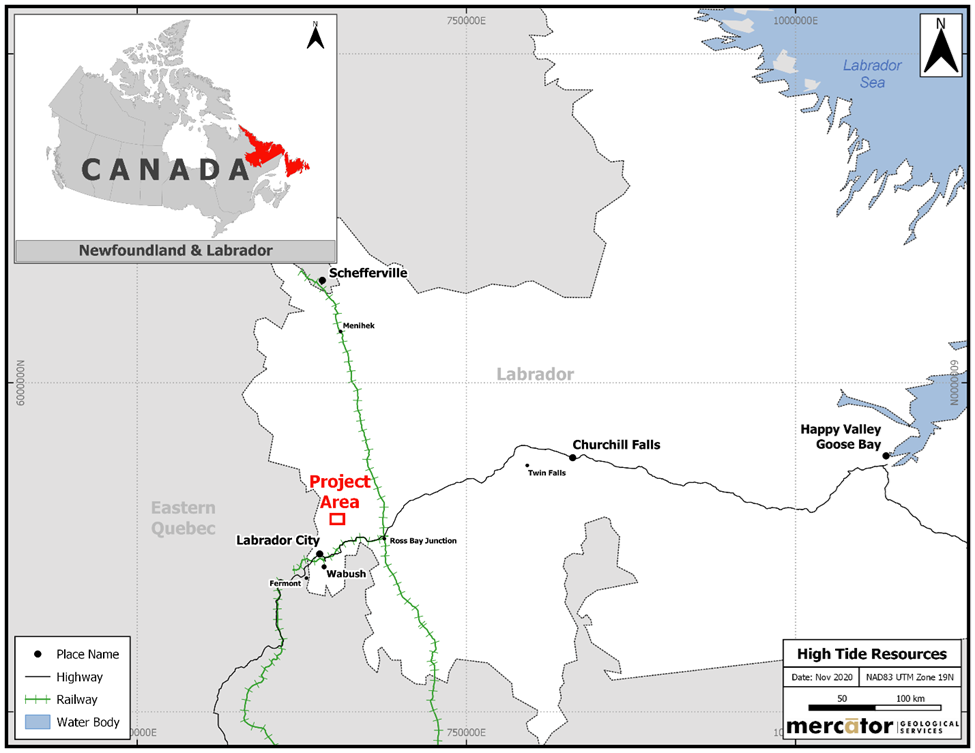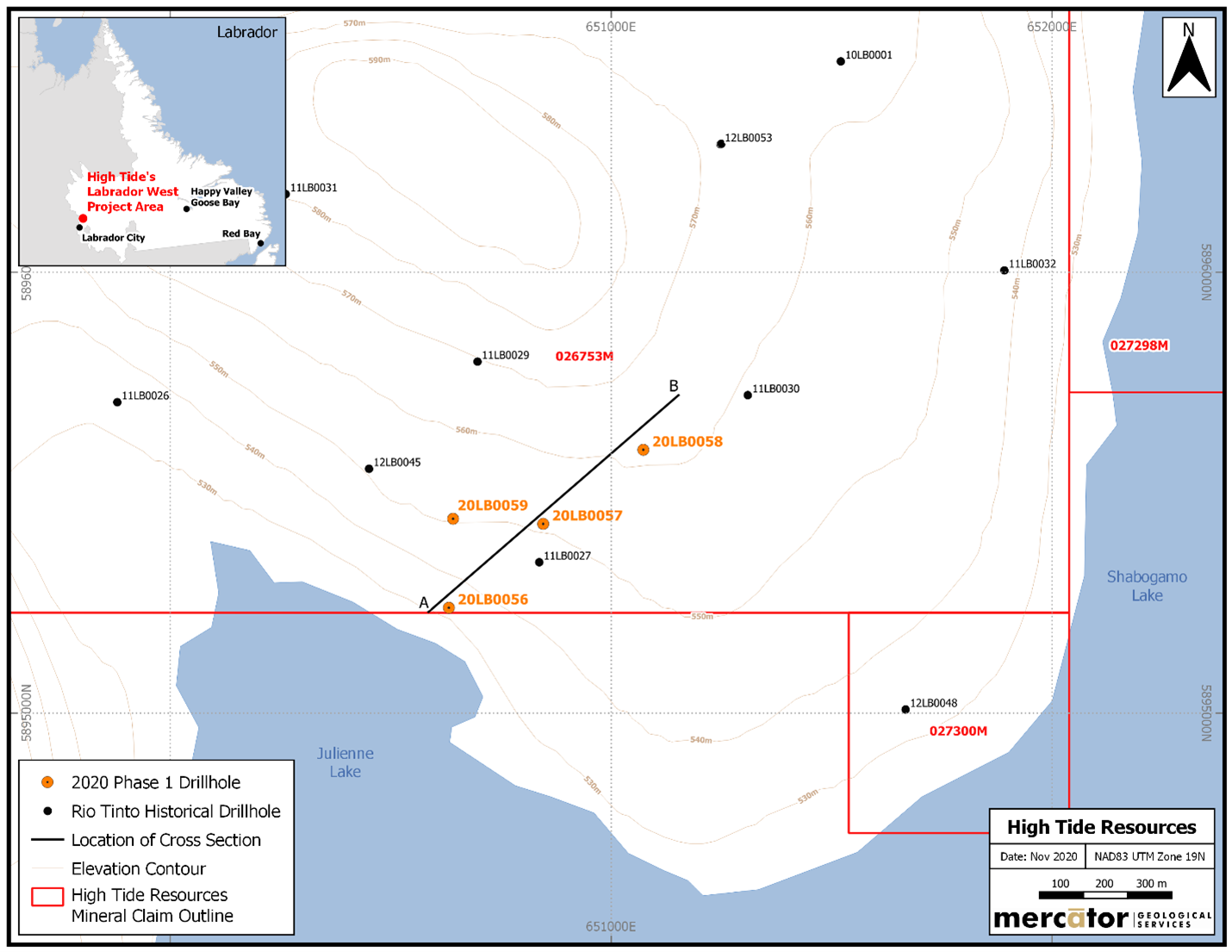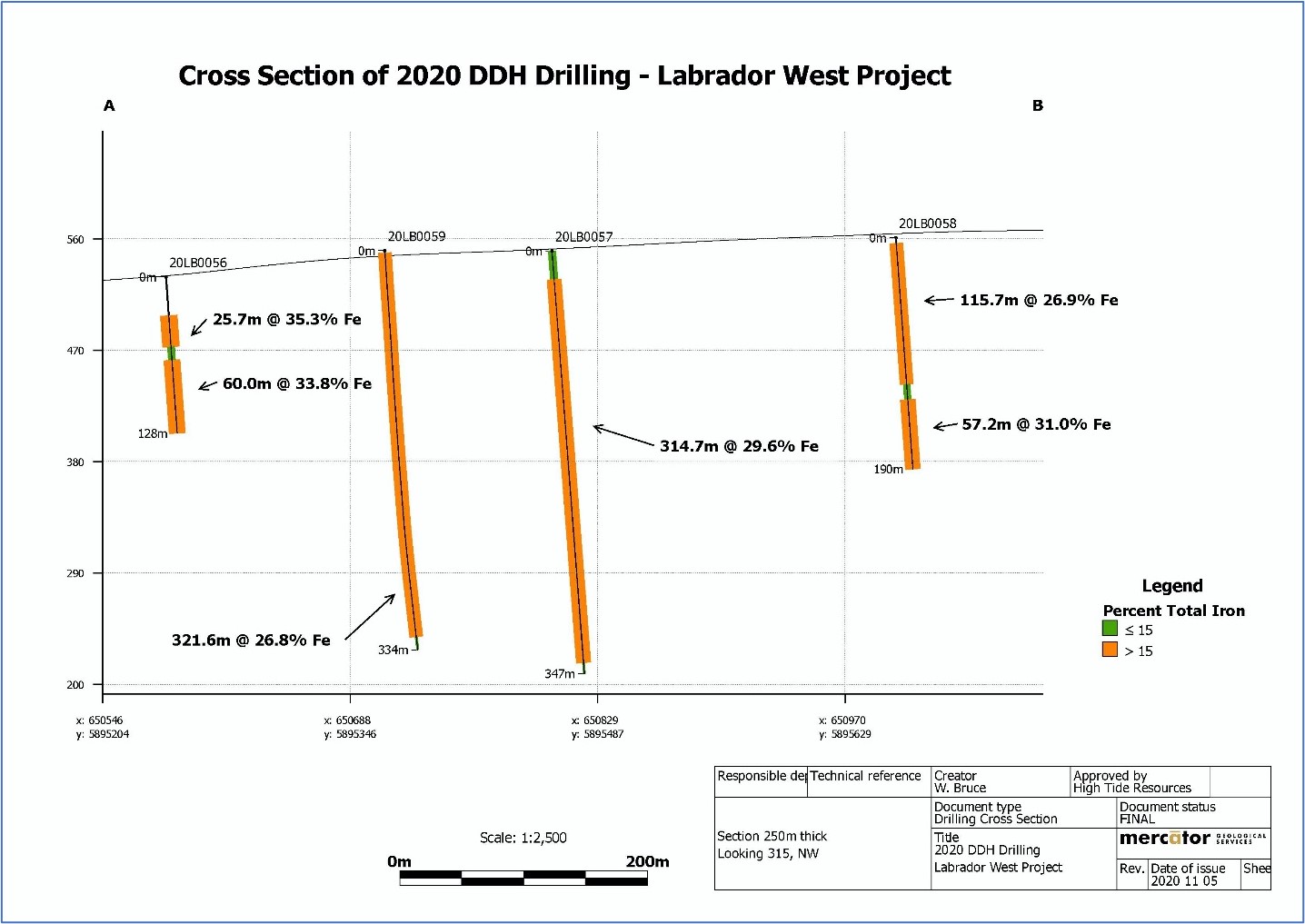High Tide Resources Intersects 314.7 m Grading 29.6% Total Fe From Its Labrador West Iron Project
High Tide Resources Corp. has announced assay results from its Phase One drilling program at the Labrador West Iron Property. A total of 999 meters were drilled, encountering high-grade iron oxide mineralization. Notable findings include:
- 35.3% Total Fe over 25.7m
- 29.6% Total Fe over 314.7m
- 26.9% Total Fe over 115.7m
- 26.8% Total Fe over 321.5m
The results are comparable to historical data from Rio Tinto. Future plans involve a technical report and public listing in early 2021, along with a resource estimate.
- High-grade iron oxide mineralization indicated by assay results with Fe concentrations exceeding 35%.
- Plans for a NI 43-101 technical report enhance credibility and investor interest.
- Upcoming public listing in 2021 may improve liquidity and valuation.
- Two drill holes were stopped due to poor ground conditions, indicating potential drilling challenges.
- Core loss was noted during drilling, which could affect the reliability of data.
TORONTO, ON / ACCESSWIRE / November 11, 2020 / High Tide Resources Corp. ("High Tide" or the "Company") is pleased to report assay results from its Phase One core drilling program on the Labrador West Iron Property ("Labrador West" or the "Property"). High Tide is a majority controlled private subsidiary of Avidian Gold Corp ("Avidian")(TSXV:AVG)(OTCQB:AVGDF), a company with advanced stage gold assets in Alaska and Nevada.
A total of four NQ-diameter diamond drill holes totaling 999 metres were completed at Labrador West between July and September 2020 (Table 1). These drill holes were designed to the test the lithological and grade continuity between several key and widely spaced historical Rio Tinto Exploration Canada Inc. ("Rio Tinto") drill holes completed on the property from 2010 to 2012. Due to poor ground conditions two of the four holes, 56 & 58, were stopped while still in high-grade iron oxide mineralization but will be redrilled to establish extent and depth of mineralization.
Labrador West Assay Highlights Include:
Hole 20LB0056
Hole 20LB0057
Hole 20LB0058
Hole 20LB0059
High Tide's President and VP of Exploration, Steve Roebuck, states: "We are very pleased with the drill results from Labrador West. The iron grades and intercept widths are in line with, and in places even exceed, Rio Tinto's historical results and validate our belief in the high-quality of the project. Our near-term plans include releasing a NI 43-101 technical report in the coming weeks with plans to take High Tide public in the first quarter of 2021, followed by a drilling campaign next spring/summer that will lead to a maiden resource estimate."
The Labrador West Iron Property is comprised of four mineral licences (99 mineral claims), 2,475 hectares in size. These four mineral licences are located less than 30 km northeast of the town of Labrador City within the Labrador Trough in Newfoundland and Labrador (Figure 1). The Labrador Trough of western Labrador and Quebec constitutes Canada's premier iron producing district and is host to major iron ore deposits that have been mined for more than half a century. Labrador West is located in close proximity to Iron Ore Company of Canada's (IOC) Carol Lake iron ore mining operations within the Sokoman Formation. High Tide acquired the Property in August 2019 through an option agreement with Altius Resources Inc. ("Altius").
Figure 1: Labrador West Iron Property Location

The drilling program and core logging and sampling activities were supervised by a Qualified Person from Mercator Geological Services Limited ("Mercator") using Canadian Institute of Mining, Metallurgy and Petroleum ("CIM") best practice methods that included a strict Quality Assurance and Quality Control ("QAQC") Program. The Phase One diamond drilling program was completed on Crown Land using a CDI 500 heli-portable diamond drilling rig provided by Cartwright Drilling Inc. ("Cartwright") of Happy Valley - Goose Bay, NL and supported by a Eurocopter AS350 B2 helicopter provided by Heli-Boreal Inc. of Sept-Îles Québec. The drilling program was completed using NQ drilling rods which return drill core with a diameter of 47.6 mm. HW diameter casing was also used to stabilize the hole and to increase core recoveries in areas with poor ground conditions. In some drill holes core loss was evident due to poor ground conditions and noted in the geotechnical logs.
Table 1: Summary of Labrador West Phase One Drilling Program
Drill Hole | Easting (m) | Northing (m) | Azimuth (º) | Inclination (º) | Hole Depth (m) |
20LB0056* | 650609 | 5895214 | 341.0 | -80 | 128 |
20LB0057 | 650850 | 5895414 | 340.8 | -80 | 347 |
20LB0058* | 651068 | 5895589 | 339.6 | -80 | 190 |
20LB0059 | 650631 | 5895442 | 339.8 | -80 | 334 |
Total metres (m) | 999 | ||||
Notes:
- Collar locations were surveyed using a handheld Garmin 64s GPS unit and are reported in UTM NAD83 Zone 19N
- True widths are estimated to be approximately
90% of the reported intervals - Core drilling program using NQ diameter drilling rods
- *Holes were stopped in mineralization due to poor ground conditions
Drill hole locations (collar coordinates) were surveyed using a handheld Garmin 64s GPS unit and recorded in UTM NAD83 Zone 19N (Table 1). Drill core was logged and sampled for assay testing using a strict QAQC procedure, and magnetic susceptibility was recorded using a KT-10 magnetic susceptibility meter. Geotechnical logging recorded core box tags, total core recovery (TCR), and rock quality designation (RQD). Downhole surveys were completed on two of the four drill holes completed using a Reflex Gyro downhole survey tool to measure the dip and true azimuth of the drill hole at 25 m intervals.
A summary of significant assay results from the Labrador West Phase One core drilling program is shown below in Table 2 and collar locations in Figure 2. A drill hole cross section is also shown below in Figure 3 indicating the composite assay results.
Table 2: Significant Assay Results from Labrador West Phase One Drilling Program
Hole ID | From (m) | To (m) | Interval (m) | Total Fe (%) | Recovery (%) |
20LB0056 | 31.5 | 57.2 | 25.7 | 35.3 | 35 |
20LB0056 | 68.0 | 128.0 | 60.0 | 33.8 | 66 |
20LB0057 | 23.3 | 338.0 | 314.7 | 29.6 | 74 |
20LB0058 | 4.5 | 120.2 | 115.7 | 26.9 | 100 |
20LB0058 | 132.8 | 190.0 | 57.2 | 31.0 | 91 |
20LB0059 | 1.8 | 323.3 | 321.5 | 26.8 | 70 |
Notes:
- Assay composites are reported using a
15% Total Fe cut-off grade - Minimum composite length = 10 m
- Maximum consecutive waste interval = 10 m
- Composite assay intervals shown are measured core lengths and true widths are estimated to be approximately
90% of the reported intervals. The Company and its geological consultants are not aware of any drilling, sampling, recovery or other factors that could materially affect the accuracy or reliability of the assay data disclosed herein. Sample recoveries vary from3% to100% and samples were constrained to a minimum of 30 cm of rock volume. Sample sizes averaged 2 metres with more constrained sampling as deemed necessary by the logging geologist. Recoveries were estimated for composite intervals using geotechnical information recorded at time of logging.
Figure 2: Labrador West Iron Property Phase One Drill Hole Locations

Geological Summary
The Phase One core drilling program intercepted rocks of the Sokoman Formation which can be informally divided into three iron formation lithofacies characterised by different mineralogy and textures. These three lithofacies are not exclusive and there can be some overlap in mineral assemblages. Iron formation facies present in the project area are known to be heterogeneous and bands with differing composition and mineralogy can occur at the sub-millimetre scale. Bedrock sequences are predominantly comprised of oxide facies iron formation containing abundant specular hematite and/or magnetite interbedded with variably altered silicate-carbonate iron formation facies lithologies. The three main lithofacies are briefly described as follows.
Oxide Facies
The oxide facies is dominated by the iron oxide minerals, hematite and magnetite accompanied by quartz occurring predominantly as chert. There may be accessory carbonates (calcite or dolomite), silicates, and, rarely, manganese oxides or carbonates. Production experience in the Labrador Trough indicates that hematite and magnetite in such a lithological setting tend to be readily easily recoverable using modern beneficiation methods, and produce high purity, desirable iron concentrates.
Figure 3: Labrador West Iron Property Cross Section of 2020 Drilling (Looking NW)

Carbonate Facies
The carbonate facies consist of quartz (chert) and carbonate. In the project area, the carbonate is of variable grainsize and light to dark grey in colour and commonly weathers to a distinctive reddish-brown colour. Composition appears to vary from almost pure siderite to ferroan dolomite. Quartz is generally white and recrystallised but in places may be cherty and almost black on freshly broken surfaces. Rocks are generally thinly-banded, with layers usually ranging from a few millimetres to several centimetres. Thicker banding appears to be associated with proximity to the oxide facies and in places carbonate and quartz-rich bands may be up to tens of centimetres thick.
Silicate Facies
In the project area, silicate-rich facies are typically thin to medium-banded with quartz-rich bands from millimetres up to several centimetres thick. Fibrous amphiboles such as grunerite are common in some areas. Elongate silicate grains often define pronounced stretching lineation in high strain zones. Magnetite content is highly variable and locally magnetite may occur in semi-massive bands from several centimetres to a metre in thickest. Like Rio Tinto, High Tide has used silicate facies as a field term to denote any rock unit having greater than a few metres where silicates appear to comprise the majority of the non-quartz mineral species.
Between 2010 and 2012, Rio Tinto completed a total of 18 historical drill holes (4,227 m) on the Property, and also completed various LiDAR and airborne magnetic, electromagnetic, and gravity surveys. Rio Tinto concluded that discovering an iron ore deposit in the area with the necessary grade and tonnage to economically mine included identifying areas where structural controls such as folding and/or faulting have upgraded thinner mineralized units into a much thicker and potentially mineable package. Finding these zones requires further interpretation of gravity, magnetic, and drill core data, and additional diamond drilling which the Company has recently commenced with Phase One. All four drill holes completed to date by High Tide intersected high grade intervals of iron predominantly oxide facies iron formation with interbedded carbonate and silicates facies iron formations. This is consistent with the results from four historical Rio Tinto drill holes located in the immediate area of the 2020 core drilling.
Sampling Protocol, Analytical Procedures, and QAQC
Mercator supervised the Phase One diamond drilling program. This included designing and implementing a comprehensive QAQC program consistent with CIM best practice methods. Core was delivered to a secured location for geological and geotechnical logging, and sampling. After logging was completed selected core was marked for sampling and sawing. QAQC certified reference materials were used for blanks and standards and generally inserted at a rate of every alternating 10th sample. Duplicates were also collected every 45th or 95th sample (or nearby section amenable to easy sampling). All samples were stored in a secure location and in sealed buckets prior to shipment to the laboratory for assay testing.
Sample shipments were securely delivered via courier to Activision Laboratories ("ActLabs") in Ancaster, Ontario for sample preparation and analytical testing. Sample preparation was through the laboratory's standard rock preparation protocol that begins with jaw crushing followed by pulverization of a sample split (250g) to generate a pulp having
Qualified Person Statement
All scientific and technical information disclosed in this news release was prepared and approved by Peter Webster, P.Geo., President of Mercator Geological Services Limited and a Qualified Person as defined by NI 43-101. Steve Roebuck, P.Geo., President & VP Exploration of High Tide Resources Corp. is also a Qualified Person as defined by NI 43-101 and has reviewed and approved this news release.
About High Tide Resources Corp.
High Tide is a private corporation that is focused on, and committed to, the development of advanced-stage mineral projects in Canada using industry best practices combined with a strong social license from local communities. It has a disciplined and veteran management team of technical and business-oriented professionals that is advancing its Labrador West iron property located in Newfoundland & Labrador, Canada. High Tide is majority owned by Avidian Gold Corp.
For further information, please contact:
Steve Roebuck
High Tide President & VP Exploration
Mobile: (905) 741-5458
Email: sroebuck@avidiangold.com
Neither TSX Venture Exchange nor its Regulation Services Provider (as that term is defined in the policies of the TSX Venture Exchange) accepts responsibility for the adequacy or accuracy of this news release.
Forward-looking information
This News Release includes certain "forward-looking statements". These statements are based on information currently available to the Company and the Company provides no assurance that actual results will meet management's expectations. Forward-looking statements include estimates and statements that describe the Company's future plans, objectives or goals, including words to the effect that the Company or management expects a stated condition or result to occur. Forward-looking statements may be identified by such terms as "believes", "anticipates", "expects", "estimates", "may", "could", "would", "will", or "plan". Since forward-looking statements are based on assumptions and address future events and conditions, by their very nature they involve inherent risks and uncertainties. Actual results relating to, among other things, results of exploration, project development, reclamation and capital costs of the Company's mineral properties, and the Company's financial condition and prospects, could differ materially from
those currently anticipated in such statements for many reasons such as: changes in general economic conditions and conditions in the financial markets; changes in demand and prices for minerals; litigation, legislative, environmental and other judicial, regulatory, political and competitive developments; technological and operational difficulties encountered in connection with the activities of the Company; and other matters discussed in this news release. This list is not exhaustive of the factors that may affect any of the Company's forward-looking statements. These and other factors should be considered carefully and readers should not place undue reliance on the Company's forward-looking statements. The Company does not undertake to update any forward-looking statement that may be made from time to time by the Company or on its behalf, except in accordance with applicable securities laws.
SOURCE: Avidian Gold Corp.
View source version on accesswire.com:
https://www.accesswire.com/615936/High-Tide-Resources-Intersects-3147-m-Grading-296-Total-Fe-From-Its-Labrador-West-Iron-Project
FAQ
What are the key assay results from High Tide Resources' Labrador West Iron Property?
When will High Tide Resources go public?
What is the significance of the drilling results at Labrador West for AVGDF shareholders?







